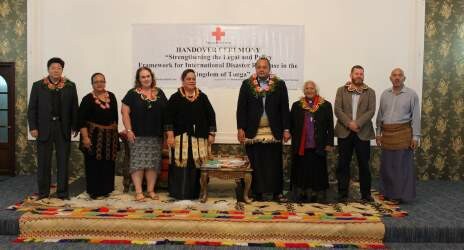
Among those attending were the Hon. ‘Alaileula Tuku’aho, Chairlady of Tonga Red Cross, Hon. Siaosi Sovaleni, Deputy Prime Minister of Tonga, several ministers and other senior officials, representatives of the diplomatic corps and civil society, as well as Sione Taumoefolau, Secretary General of Tonga Red Cross, board members and staff.
The new report analyses Tonga’s legal and policy framework regulating international assistance in the event of a disaster using the Guidelines for the Domestic Facilitation and Regulation of International Disaster Relief and Initial Recovery Assistance (also known as the “IDRL Guidelines”) as a basis for review. It also few on the Model Act for the Facilitation and Regulation of International Disaster Relief and Initial Recovery Assistance developed by the IFRC, OCHA and IPU for some of its recommendations.
Rosamond Bing, the legal researcher who prepared the report, explained that the chief recommendation was the development of a set of comprehensive regulations on the management of international disaster assistance, in order to consolidate existing practices and intentions into a single document. It further calls for the establishment of a focal point agency to serve as a main liaison between the government and assisting international actors, and the development of a Single Window International Facilitation Team (SWIFT) consisting of officials from a variety of relevant ministries and departments with authority over the various requirements related to entry of incoming international relief programmes, personnel, goods, equipment and transport.
In his speech, the Deputy Prime Minister brought to attention Tonga’s potential dependency on international assistance from a wide range of stakeholders in the aftermath of a major disaster – including from civil society, Tongan diaspora and foreign partners. The aftermath of past disasters in region has proven to be overwhelming in terms of the impact and destruction, the volume of assistance flooding into the country and the ability of the Government to respond and coordinate.
The Deputy Prime Minister went on to say that this report represents a milestone in the government’s efforts to respond to disasters in a timely and effective manner. The study presents a timely opportunity for Tonga to review its ability to request and facilitate international disaster relief. He also expressed that the principles and standards espoused by the IDRL Guidelines are an excellent guidance for Tonga to strengthen its regulatory framework with a view to ensuring that the welfare of those who are affected in a disaster are protected.
The Deputy Prime Minister, having recently returned from the Third UN World Conference on Climate Change in Japan and committing to the Sendai Framework, is of the opinion that this report and its recommendations will guide the Government of Tonga in meeting some of the key aspects of that framework.
The full version of the report is available here.
The Tonga Red Cross Society hosted a handover event for its study on IDRL in Tonga with the participation several personalities including the Deputy Prime Minister of Tonga.